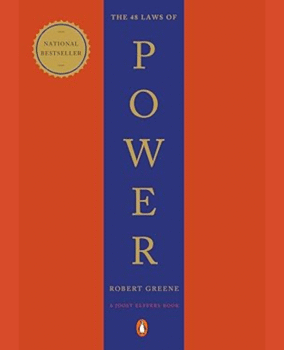The 48 Laws of Power Book Summary
The Ultimate Guide to Mastering Human Influence
“Never outshine the master.” – Robert Greene, The 48 Laws of Power
There are books that teach, books that inspire, and then there’s The 48 Laws of Power — a book that reveals the raw, unfiltered psychology of influence. Written by Robert Greene, this global bestseller isn’t just a guide to power — it’s a mirror reflecting how power truly works in the real world.
Whether you’re an entrepreneur, leader, or simply curious about human nature, understanding these laws will transform how you think, act, and influence others.
In this in-depth guide, you’ll discover:
- The core philosophy behind the book
- The complete summary of all 48 laws
- Real-world applications, controversies, and criticism
- And how to use these laws ethically in modern life
Let’s dive into the world where power, strategy, and psychology intersect.
About the Author: Who Is Robert Greene?

Robert Greene, born in 1959, is an American author known for his deep explorations into strategy, seduction, power, and human behavior. Before fame, he worked over 80 jobs — from construction worker to Hollywood writer — giving him firsthand exposure to the complex nature of human ambition and manipulation.
He holds a degree in Classical Studies from the University of Wisconsin-Madison, which profoundly shaped his writing style. His works are heavily influenced by historical figures, philosophy, and psychology.
Other famous works by Robert Greene:
- The Art of Seduction – exploring charm, attraction, and persuasion
- The 33 Strategies of War – lessons from military history
- The 50th Law – co-written with rapper 50 Cent, about fearlessness
- Mastery – the science of achieving excellence
- The Laws of Human Nature – understanding people’s deepest motivations
Greene’s philosophy is simple:
Power is not evil. It’s neutral. What matters is how you use it.
What Is “The 48 Laws of Power” About?
First published in 1998, The 48 Laws of Power is a handbook for understanding power dynamics — how it’s gained, used, and lost. Greene draws from history’s most powerful individuals — from Machiavelli and Napoleon to Sun Tzu and Queen Elizabeth I — to illustrate each law.
Every chapter is structured as:
- The Law itself
- Interpretation and strategy
- Historical examples
- Reversal — when not to apply the law
The book is neither moral nor immoral — it simply reveals the mechanics of human behavior that have governed societies for centuries.
But it’s not without controversy — banned in several prisons and criticized for “teaching manipulation,” it’s still considered a must-read by CEOs, athletes, artists, and even politicians.
The 48 Laws of Power – Complete Summary
Below is a condensed yet comprehensive summary of all 48 laws — each revealing timeless truths about strategy, influence, and human psychology.
Section 1: The Laws of Power in Action (Laws 1–12)
Law 1: Never Outshine the Master
Always make those above you feel superior. If you appear too competent, you threaten their ego.
Example: Nicolas Fouquet’s downfall under King Louis XIV.
Lesson: Make your superiors feel brilliant, not insecure.
Law 2: Never Put Too Much Trust in Friends, Learn How to Use Enemies
Friends can betray emotionally; enemies act strategically.
Example: Otto von Bismarck’s political genius.
Lesson: Value loyalty over comfort.
Law 3: Conceal Your Intentions
Keep people off balance by hiding your goals.
Example: Napoleon’s secret military plans.
Lesson: Mystery equals power.
Law 4: Always Say Less Than Necessary
Silence disarms. Words reveal too much.
Example: Louis XIV’s reserved style.
Lesson: Speak less, appear wiser.
Law 5: So Much Depends on Reputation – Guard It With Your Life
Reputation builds or destroys you.
Example: Julius Caesar’s public image management.
Lesson: Protect your name as your greatest asset.
Law 6: Court Attention at All Costs
Visibility is power.
Example: P.T. Barnum’s outrageous publicity stunts.
Lesson: Don’t fade into the background.
Law 7: Get Others to Do the Work for You, But Always Take the Credit
Delegate smartly. Credit amplifies your authority.
Lesson: Use others’ skills to enhance your own image.
Law 8: Make Other People Come to You – Use Bait if Necessary
Control the situation by controlling where and when.
Lesson: The one who dictates the terms holds power.
Law 9: Win Through Your Actions, Never Through Argument
Actions inspire; arguments breed resentment.
Lesson: Let results speak louder than opinions.
Law 10: Infection: Avoid the Unhappy and Unlucky
Energy is contagious. Surround yourself with winners.
Lesson: Protect your emotional and strategic environment.
Law 11: Learn to Keep People Dependent on You
Dependency equals control.
Lesson: Create value others can’t easily replace.
Law 12: Use Selective Honesty and Generosity to Disarm Your Victim
Strategic kindness builds trust.
Lesson: Authenticity is a weapon when used with intent.
Section 2: The Subtle Art of Influence (Laws 13–24)
Law 13: When Asking for Help, Appeal to Self-Interest, Not Mercy
Show how helping you benefits them.
Lesson: People act out of self-gain.
Law 14: Pose as a Friend, Work as a Spy
Observe quietly; information is leverage.
Lesson: Knowledge is the currency of power.
Law 15: Crush Your Enemy Totally
Never leave room for revenge.
Lesson: Mercy can lead to future threats.
Law 16: Use Absence to Increase Respect and Honor
Scarcity amplifies value.
Lesson: Withdraw strategically to grow importance.
Law 17: Keep Others in Suspended Terror – Cultivate an Air of Unpredictability
Surprise keeps others cautious.
Lesson: Predictability kills authority.
Law 18: Do Not Build Fortresses to Protect Yourself – Isolation Is Dangerous
Isolation weakens intelligence and influence.
Lesson: Stay connected to the real world.
Law 19: Know Who You’re Dealing With – Do Not Offend the Wrong Person
People differ in ego and emotion.
Lesson: Understand personalities before acting.
Law 20: Do Not Commit to Anyone
Freedom gives leverage.
Lesson: Stay adaptable and non-aligned.
Law 21: Play a Sucker to Catch a Sucker – Seem Dumber Than Your Mark
Feign ignorance to disarm others.
Lesson: Underestimation is strategic armor.
Law 22: Use the Surrender Tactic: Transform Weakness into Power
Yield temporarily to gain later.
Lesson: Control through timing, not resistance.
Law 23: Concentrate Your Forces
Focus power on one decisive point.
Lesson: Dilution weakens strength.
Law 24: Play the Perfect Courtier
Master charm, etiquette, and subtle flattery.
Lesson: Social intelligence sustains power.
Section 3: Strategy and Mastery (Laws 25–36)
Law 25: Re-Create Yourself
Be your own architect. Reinvention attracts admiration.
Lesson: Control your identity.
Law 26: Keep Your Hands Clean
Let others do the dirty work.
Lesson: Appear pure; act through proxies.
Law 27: Play on People’s Need to Believe
Manipulate emotions by offering faith or cause.
Lesson: People crave belief — guide it.
Law 28: Enter Action with Boldness
Hesitation signals weakness.
Lesson: Confidence multiplies power.
Law 29: Plan All the Way to the End
Anticipate outcomes before acting.
Lesson: Strategy demands foresight.
Law 30: Make Your Accomplishments Seem Effortless
Effortlessness fascinates others.
Lesson: Hide the struggle; show the result.
Law 31: Control the Options – Get Others to Play with the Cards You Deal
Frame choices in your favor.
Lesson: Control outcomes through perception.
Law 32: Play to People’s Fantasies
Truth bores; dreams captivate.
Lesson: Sell illusions, not logic.
Law 33: Discover Each Man’s Thumbscrew
Find what motivates or scares each person.
Lesson: Influence begins with understanding weaknesses.
Law 34: Be Royal in Your Own Fashion – Act Like a King to Be Treated Like One
Confidence attracts respect.
Lesson: Set your own value standard.
Law 35: Master the Art of Timing
Patience turns good strategy into success.
Lesson: Wait for the perfect moment.
Law 36: Disdain Things You Cannot Have
Ignoring what you can’t control shows strength.
Lesson: Desire gives power away.
Section 4: The Eternal Game of Power (Laws 37–48)
Law 37: Create Compelling Spectacles
People believe what they see.
Lesson: Visuals influence deeper than words.
Law 38: Think as You Like but Behave Like Others
Blend in while holding your uniqueness.
Lesson: Social harmony sustains progress.
Law 39: Stir Up Waters to Catch Fish
Anger blinds others — use chaos to control.
Lesson: Emotional manipulation breeds opportunity.
Law 40: Despise the Free Lunch
What costs nothing often costs dignity.
Lesson: Invest to stay independent.
Law 41: Avoid Stepping Into a Great Man’s Shoes
Forge your own path.
Lesson: Legacy limits innovation.
Law 42: Strike the Shepherd and the Sheep Will Scatter
Remove the leader, the followers fall apart.
Lesson: Influence systems, not individuals.
Law 43: Work on the Hearts and Minds of Others
Influence emotionally before intellectually.
Lesson: Empathy wins loyalty.
Law 44: Disarm and Infuriate with the Mirror Effect
Reflect others’ actions to neutralize them.
Lesson: Use mimicry as a psychological shield.
Law 45: Preach the Need for Change, But Never Reform Too Much at Once
Gradual change prevents resistance.
Lesson: Revolution is dangerous; evolution wins.
Law 46: Never Appear Too Perfect
Flaws make you relatable.
Lesson: Perfection provokes envy.
Law 47: Do Not Go Past the Mark You Aimed For
Know when to stop.
Lesson: Restraint preserves power.
Law 48: Assume Formlessness
Adapt constantly. Change is survival.
Lesson: Flexibility is the ultimate strength.
Key Lessons from The 48 Laws of Power
- Power is psychological. Control perception, and you control reality.
- Observation beats emotion. Detachment gives clarity.
- Power demands patience. Rushing leads to mistakes.
- Self-awareness is your weapon. Understand your weaknesses first.
- Influence is art, not aggression.
- People crave leadership. Power attracts followers.
- Perception > Truth. Appear powerful to become powerful.
- Control your emotions. Those who can’t, lose influence.
- Adaptability wins. Change your shape to fit the situation.
- Respect human nature. It never truly changes.
Controversies & Criticism
The 48 Laws of Power has been labeled “manipulative” and “immoral” by some critics. In fact, the book is banned in several U.S. prisons for fear it could teach inmates manipulation tactics.
However, Greene defends his work as realistic, not prescriptive — he doesn’t tell readers to manipulate, but how manipulation works in the real world.
In essence, it’s a mirror — showing how people already behave when power is at stake.
“The world is not a moral place. The sooner you understand that, the stronger you become.” — Robert Greene
How to Use These Laws Ethically
- Self-Defense: Recognize when others use power tactics against you.
- Leadership: Influence without exploitation.
- Negotiation: Stay composed, read others’ motives.
- Personal Growth: Build confidence and social awareness.
- Business: Manage perception and persuasion ethically.
Remember — the true master of power is not one who controls others, but one who controls himself.
Similar Books You’ll Love
If The 48 Laws of Power fascinated you, explore these related titles:
- The Art of Seduction – Robert Greene
- The Laws of Human Nature – Robert Greene
- The Prince – Niccolò Machiavelli
- How to Win Friends and Influence People – Dale Carnegie
- Atomic Habits – James Clear
- Mastery – Robert Greene
These books complement Greene’s philosophy — blending psychology, strategy, and real-world mastery.
Famous Quotes from The 48 Laws of Power
“Keep your friends for friendship, but work with the skilled and competent.”
“Never appear too perfect.”
“Power is a game — play it with strategy, not emotion.”
“When you show yourself to the world and display your talents, you naturally stir all kinds of resentment.”
“Strike the shepherd and the sheep will scatter.”
“Do not build fortresses to protect yourself. Isolation is dangerous.”
“Your reputation is your lifeline — guard it fiercely.”
“The future belongs to those who can adapt.”
Frequently Asked Questions (FAQ)
Q1: What is the main message of The 48 Laws of Power?
The core message of The 48 Laws of Power is that power is ever-present — in relationships, business, politics, and daily life — and understanding how it works is essential for survival and success. Robert Greene explains that power itself is not inherently evil; it’s neutral. What matters is how you apply it. The book encourages readers to become aware of manipulation, avoid being exploited, and use strategic thinking to achieve influence without losing integrity.
Q2: Is it ethical to apply these laws in real life?
Yes — if applied with awareness and ethics. Greene’s intention wasn’t to promote manipulation, but to expose it. The 48 laws can be used positively — for example, in leadership, negotiation, communication, and self-protection. However, misusing them to deceive or exploit others can have negative consequences. In essence, the ethical way to use these laws is to protect yourself, not to harm others.
Q3: Why is The 48 Laws of Power banned in some places?
The book is banned in several prisons and certain institutions because authorities fear it could teach manipulation, social control, or psychological influence that might disrupt order. Some schools and workplaces also discourage it for similar reasons. Despite that, many business leaders, politicians, and thinkers consider it one of the most valuable books for understanding real-world human behavior. The controversy itself proves Greene’s point — power is both fascinating and feared.
Q4: Who should read The 48 Laws of Power?
This book is perfect for anyone who wants to improve their understanding of human psychology, strategy, and influence. It’s especially recommended for entrepreneurs, leaders, marketers, negotiators, and students of psychology or politics. Even if you’re not seeking “power,” reading it helps you identify when others use power tactics against you — giving you emotional intelligence and defense in social situations.
Q5: What are the most powerful laws from the book?
While all 48 laws carry significance, readers often highlight these as the most impactful:
- Law 1: Never Outshine the Master
- Law 3: Conceal Your Intentions
- Law 5: Guard Your Reputation
- Law 15: Crush Your Enemy Totally
- Law 33: Discover Each Man’s Thumbscrew
- Law 48: Assume Formlessness
These laws teach strategic patience, adaptability, and emotional control — traits vital for long-term success and protection in competitive environments.
Q6: Is The 48 Laws of Power suitable for beginners?
Yes, but it’s best approached gradually. The book is dense with historical examples and philosophical insights, so reading one or two laws at a time allows for deeper reflection. Beginners can start by identifying which laws apply to their personal or professional lives. Over time, the reader develops sharper emotional intelligence and awareness of social dynamics — making it a lifelong reference rather than a one-time read.
Q7: How can I apply the 48 laws in real life without becoming manipulative?
You can apply these laws by focusing on self-awareness, strategy, and emotional intelligence. For example:
- Use Law 4 (Always Say Less Than Necessary) to improve communication and leadership presence.
- Apply Law 6 (Court Attention at All Costs) for personal branding and visibility.
- Practice Law 35 (Master the Art of Timing) to make better business or career decisions.
Instead of using them to control others, use them to stay composed, strategic, and respected in every interaction.
Q8: What makes The 48 Laws of Power different from other self-help books?
Unlike typical self-help books that focus on positivity or motivation, Greene’s book dives into the darker side of human nature — ambition, envy, manipulation, and control. It doesn’t sugarcoat reality. Instead, it gives readers the knowledge to navigate power struggles intelligently. It’s not about being “good” or “bad” — it’s about being aware. This makes it a blend of philosophy, psychology, and strategy — closer to The Prince by Machiavelli than to Atomic Habits.
Q9: What can I learn from this book as a leader or entrepreneur?
Leaders can learn how to manage perception, inspire loyalty, and handle competition with wisdom. Entrepreneurs can use these principles to build strong reputations, negotiate effectively, and maintain influence in fast-changing environments. The key is to use power responsibly — balancing authority with empathy. Greene’s work reminds leaders that power without awareness leads to downfall, but awareness without action leads to stagnation.
Q10: How has The 48 Laws of Power influenced modern culture?
The book has become a cultural phenomenon — quoted by celebrities, CEOs, athletes, and rappers alike. Artists like Jay-Z, 50 Cent, and Drake have publicly praised it for its insight into human psychology and social strategy. In business schools and online communities, it’s often used to discuss leadership, persuasion, and branding. Even decades later, its lessons continue to shape conversations about ambition, influence, and ethics.
Final Thoughts – The Art of Power in Modern Life
The 48 Laws of Power isn’t just a book — it’s a psychological manual for the real world. It exposes how power truly operates, whether in the boardroom, relationships, or politics.
Robert Greene doesn’t glorify manipulation; he reveals it — so we can navigate it wisely.
Power, when used with awareness and restraint, becomes not a weapon, but a tool for leadership, protection, and progress.
So the next time you feel powerless, remember this:
“Power is not about dominance. It’s about influence, understanding, and control — starting with yourself.”
✅ Key Takeaway
If you master these laws, you don’t become a manipulator — you become immune to manipulation.
Free Download (PDF)
Free Download PDF BookDownload — Atomic Habits by James Clear (PDF)
Format: PDF (eBook)
File size: varies by edition
Short disclaimer:
This download is presented for educational purposes only. Always support the author and publisher by purchasing the official edition if you find the material useful. Unauthorized distribution or piracy harms authors and the community.
Read Also: Looking for the Enemy Taliban Book Free Download
Was this article helpful?
Loved it? Share your thoughts with a quick comment, submit recommendations and suggestions or leave a star rating in comments!







